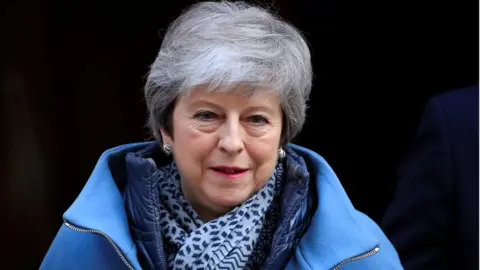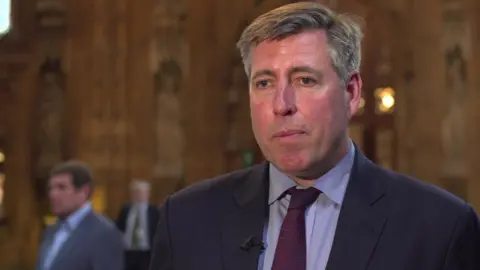Theresa May: Senior Tories rule out early challenge to PM
 Reuters
ReutersSenior Tories have ruled out changing their rules to allow an early challenge to Theresa May's leadership, but have asked for more clarity about how long she will remain in office.
Under current rules, MPs cannot hold a new confidence vote in her leadership until December - 12 months on from last year's vote which she won.
The 1922 Committee rejected bringing forward this deadline at a meeting.
But chair Graham Brady said MPs asked for a "clear roadmap" about her future.
And amid signs of a growing grassroots revolt against Mrs May, the Clwyd South Conservative Association has passed a motion of no confidence in the prime minister.
In a ballot of its members, only 3.7% supported Mrs May, while 88.8% said they had no confidence in her.
Last month, Mrs May pledged to stand down if and when Parliament ratified her Brexit withdrawal agreement with the EU.
Allow Twitter content?

Allow Twitter content?

Some long-standing Leave campaigners want her to announce a date now, irrespective of whether a Brexit deal is completed.
Joint executive secretary of the 1922 Nigel Evans was among them, insisting on Tuesday that the calls for her to quit had become "a clamour".
Following a meeting of all Tory MPs, Sir Graham said colleagues concerned about Mrs May's leadership were free to express their concerns to him, which would be "communicated" to Downing Street.
In light of the PM's commitment to stand down if Parliament approved a Brexit deal, he said MPs were seeking "similar clarity from her" about what would happen "in other circumstances".
"I think the 1922 executive is asking on behalf of the Conservative Party in Parliament that we should have a clear road map forward," he told the BBC.
"We haven't set out a timetable, we asked her to set out a clear timetable, just to give some certainty and clarity to colleagues in Parliament and the wider Conservative Party and to the country most importantly."

Former minister Robert Halfon said it would have been "entirely wrong" to have staged another vote right now given the uncertainty surrounding Brexit.
"The rules are the rules," he told BBC News. "We are the Conservative Party, not a Stalinist Party, where you suddenly rip up the rule book and change them if you don't like them."
"It would have been behaving like a dictatorship, not the Conservative Party."
Speaking before Wednesday's meeting, a Downing Street spokesman said the prime minister had given a commitment to stand down "earlier than she would have liked" and would not lead negotiations on the UK's future relations with the EU.
But he said this did "not necessarily mean" she would quit straight away if Brexit happened on 31 October, the new deadline set by the EU for the UK's exit.

Coup postponed?

The party's most senior backbenchers met twice behind closed doors but were split on whether to change its leadership rules.
Sources suggest there was a slim majority in favour of the status quo.
But while Conservative MPs decided not to change the rules, grandee Sir Graham Brady said they wanted more clarity from the PM on when she would stand down.
Some MPs are keen that the PM signals a willingness to go soon after next month's unwanted European elections. So this could be a coup postponed - not a coup averted.

Mrs May survived a vote of no confidence in her on 12 December 2018 by 200 to 117 votes.
The ballot was triggered after 48 Tory MPs wrote to the 1922 committee's chair Sir Graham Brady to say they had lost faith in her, exceeding the threshold required.
Some of those who wanted to change the Conservative rules argued another vote of confidence should be permitted after six months, rather than a year, if a relatively high number of MPs - 30% or 40% - call for it.
But other members of 1922 Committee, who started discussing the issue on Tuesday, were sceptical of long-term rule changes to address a very specific circumstance.
They were also worried about showing further party divisions ahead of local elections next week and the potential European elections on 23 May.
